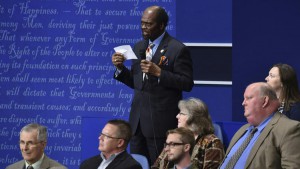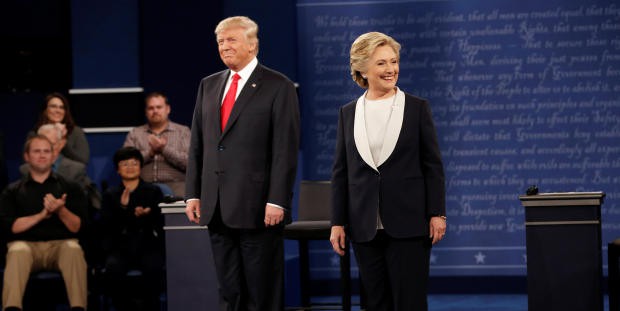
Washington, Oct. 10 – For last night night’s town hall style debate, ABC and CNN welcomed questions submitted via the Open Debate Coalition’s portal. All of the top 30 questions that moderators promised to consider received more than 20,000 votes, and an important disability rights question had nearly 12,000 votes.
Yet none of the 30 – or the disability-related question, which was #52 of thousands – were asked, leaving the disability community lacking for information.
James Carter, an undecided African American voter from Missouri, asked a question that opened the door for both candidates to include people with disabilities, a minority group that represents one-in-five Americans.
“Do you believe you can be a devoted president to all the people in the United States?” Carter asked.
“Absolutely,” Trump responded first. “I will be a president for all of our people.”
The Republican presidential hopeful was quickly criticized for his next statement:
“And I’ll be a president that will turn our inner cities around… African-Americans, the inner cities, [it’s] devastating what’s happened to our inner cities,” Trump said.
Hillary Clinton, who responded second, took a different approach. She referenced her work with the Children’s Defense Fund, where she helped people of color and people with disabilities get an education.
“I started off as a young lawyer working against discrimination against African-American children in schools and in the criminal justice system. I worked to make sure that kids with disabilities could get a public education, something that I care very much about. I have worked with Latinos — one of my first jobs in politics was down in south Texas registering Latino citizens to be able to vote. So I have a deep devotion, to use your absolutely correct word, to making sure that an every American feels like he or she has a place in our country.”
Clinton included people with disabilities three times during her debate responses. The other two references were made in the context of people Trump has ridiculed.
“He has also targeted immigrants, African Americans, Latinos, people with disabilities, POWs, Muslims, and so many others,” Clinton said at the beginning of the debate.
And then later: “And what he has said about African-Americans and Latinos, about Muslims, about POWs, about immigrants, about people with disabilities, he’s never apologized for.”
RespectAbility has asked Trump and his campaign to complete the #PwDsVote Disability Questionnaire on multiple occasions, beginning in January. While his campaign initially responded they would do so following the New Hampshire primary, and then after clinching the nomination, they have yet to do so. In July, the Alliance Center for Independence and REV UP NJ held a call-in day to encourage Trump to respond. More recently, The American Association of People with Disabilities and the National Council on Independent Living sent his campaign the REV UP questionnaire, another nonpartisan disability questionnaire, which he also has yet to complete. Clinton has responded to both questionnaires.
Shifting Attention to Down Ballot Elections
The political conversation is not only focused on the presidential election, as attention is shifting to who will control the Senate, which the Republicans currently control. FiveThirtyEight projects that the Democrats have an opportunity to take control this year. If the Democrats flip the Senate, then Sen. Schumer, who introduced the Disability Integration Act, would be in charge.
As such, RespectAbility has reached out to candidates running for Senate as well as Governor in the 2016 elections with the #PwDsVote Disability Campaign Questionnaire for Senate and Gubernatorial Candidates for people with disabilities.
Twenty-three candidates for Senate, as well as nine candidates for governor, from both sides of the aisle (19 Democrats, 13 Republicans) have responded so far, showing that disability rights is a nonpartisan issue. The responses also are geographically-diverse, coming from states all around the country.
A recently released Pew poll shows that voters with disabilities span the political and demographic spectrum and can determine who wins the elections.
Just as Clinton has made this a part of her campaign, Republican Sen. Richard Burr in North Carolina also has made it central to his re-election effort, highlighting his work in support of the bi-partisan Achieving a Better Life Experience (ABLE) Act. This new law, which also was supported by Maryland Democratic Rep. Chris Van Hollen, creates new savings accounts for individuals with disabilities in order to pay for qualified disability expenses.
Key Senate race outcomes could be changed by outreach to the disability community, including the races in Maryland, North Carolina and Wisconsin, where at least one candidate in the race has enacted legislation that has positively impacted people with disabilities.
Since disability does not discriminate, voters with disabilities are every race, age, ethnic group, religion and gender. As the presidential election has become polarized around racial and ethnic lines, disability issues can create the difference between winning and losing.
This is the first time down-ballot candidates have been asked to complete a questionnaire about disability-related issues on such a wide scale. The answers to these questionnaires are being posted on The RespectAbility Report and being used for individualized state voter guides.
Below are links to detailed answers to the questionnaire. RespectAbility and TheRespectAbilityReport are nonpartisan and do not endorse candidates. The questionnaire is purely for educational purposes.

| State | Gubernatorial Candidate | View Full Answers |
| Delaware | Colin Bonini (R) | http://bit.ly/PwDsVoteBonini |
| Missouri | Chris Koster (D) | http://bit.ly/PwDsVoteKoster |
| Montana | Greg Gianforte (R) | http://bit.ly/PwDsVoteGianforte |
| New Hampshire (lost primary) |
Derek Dextraze (D) | http://bit.ly/PwDsVoteDextraze |
| Oregon | Bud Pierce (R) | http://bit.ly/PwDsVotePierce |
| Utah | Mike Weinholtz (D) | http://bit.ly/PwDsVoteWeinholtz |
| Vermont | Sue Minter (D) | http://bit.ly/PwDsVoteMinter |
| Vermont | Phil Scott (R) | http://bit.ly/PwDsVoteScott |
| Washington | Bill Bryant (R) | http://bit.ly/PwDsVoteBryant |
| State | Senate Candidate | View Full Answers |
| Alabama | Ron Crumpton (D) | http://bit.ly/PwDsVoteCrumpton |
| California | Kamala Harris (D) | http://bit.ly/PwDsVoteHarris |
| California | Loretta Sanchez (D) | http://bit.ly/PwDsVoteSanchez |
| Florida (lost primary) | Dwight Young (R) | http://bit.ly/PwDsVoteYoung |
| Illinois | Mark Kirk (R) | http://bit.ly/PwDsVoteKirk |
| Kansas | Patrick Wiesner (R) | http://bit.ly/PwDsVoteWiesner |
| Louisiana | Foster Campell (D) | http://bit.ly/PwDsVoteCampbell |
| Louisiana | Caroline Fayard (D) | http://bit.ly/PwDsVoteFayard |
| Louisiana | Abhay Patel (R) | http://bit.ly/PwDsVotePatel |
| Maryland | Kathy Szeliga (R) | http://bit.ly/PwDsVoteSzeliga |
| Maryland | Chris Van Hollen (D) | http://bit.ly/PwDsVoteVanHollen |
| Missouri | Jason Kander (D) | http://bit.ly/PwDsVoteKander |
| Nevada | Joe Heck (R) | http://bit.ly/PwDsVoteHeck |
| Nevada | Catherine Cortez Masto (D) | http://bit.ly/PwDsVoteMasto |
| New Hampshire | Kelly Ayotte (R) | http://bit.ly/PwDsVoteAyotte |
| New Hampshire | Maggie Hassan (D) | http://bit.ly/PwDsVoteHassan |
| North Carolina | Richard Burr (R) | http://bit.ly/PwDsVoteBurr |
| North Carolina | Deborah Ross (D) | http://bit.ly/PwDsVoteRoss |
| Oregon | Mark Callahan (R) | http://bit.ly/PwDsVoteCallahan |
| Pennsylvania | Katie McGinty (D) | http://bit.ly/PwDsVoteMcGinty |
| South Dakota | Jay Williams (D) | http://bit.ly/PwDsVoteWilliams |
| Vermont | Patrick Leahy (D) | http://bit.ly/PwDsVoteLeahy |
| Wisconsin | Russ Feingold (D) | http://bit.ly/PwDsVoteFeingold |

Be First to Comment